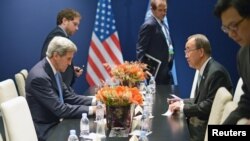Negotiators at the U.N. climate conference in Paris expect to have a final draft agreement to curb global warming by Saturday morning Paris time.
Talks are going into an extra day as teams from 196 countries aim to reach the most wide-ranging climate deal since the 1997 Kyoto protocol, this time involving not only industrialized nations, but also developing countries in a global effort to deal with climate change.
U.S. Secretary of State John Kerry said a lot of progress has been made at the U.N. climate talks in Paris, but some "very difficult" issues must be resolved.
Kerry met Friday with French Foreign Minister Laurent Fabius after what sources said was a hard night of negotiations among the 195 nations at the Paris meetings.
WATCH: Video report about pending climate agreement
Fabius said the final agreement and conclusion of the talks was extended by a day, until Saturday.
Speaking alongside United Nations Secretary-General Ban Ki-moon, Fabius said he was optimistic for an agreement.
"All the conditions are there for us to reach a universal, ambitious agreement," said Fabius. "Now it's the ministers' responsibility to make their choice tomorrow [Saturday]."
U.N. Secretary General Ban Ki-moon described the talks as "extremely difficult" as he urged delegates to put aside national concerns for the good of the entire planet.
"This is not a moment for talking about national perspectives. Good global solutions will help good local solutions," said Ban.
The biggest disagreements have been over how much financial responsibility poorer nations should take in the cost of emissions-cutting measures, and what the stated long-term goal should be for the agreement.
But a Chinese representative said the deal should have different rules for different countries, calling the demand "quite legitimate" if some populations want to maintain a certain lifestyle.
In another development, China said President Xi Jinping spoke by telephone with President Barack Obama to discuss climate change.
The White House has yet to mention to the conversation, and Beijing did not comment on what was said during the phone call.
Global temperatures
Earlier world climate conferences had set a goal of keeping the rise in global temperatures this century to two degrees (Celsius) above worldwide levels before the industrial era started. However, newer research has indicated that a lower target – such as limiting the rise in temperatures to 1.5 degrees – would be preferable.
Island nations contend that the rise in sea levels triggered by higher global temperature puts at risk their very existence.
The latest draft of the agreement also includes wording that calls for "the widest possible cooperation by all countries" in the effort to reduce the emissions of climate-altering greenhouse gases.
The question of which countries should bear the financial responsibility for emissions reduction has been a major point of contention at the conference. Representatives of the 134 developing countries objected to some industrialized countries' efforts to set conditions for funding.
The draft document, coming after four years of negotiations, is meant to offer nations options to reduce the emissions of climate-altering greenhouse gases.
Scientists have warned that as Earth warms up, the planet will be increasingly hostile to human life, with rising sea levels, devastating storms and severe droughts.
Lisa Bryan in Paris contributed to this report.







